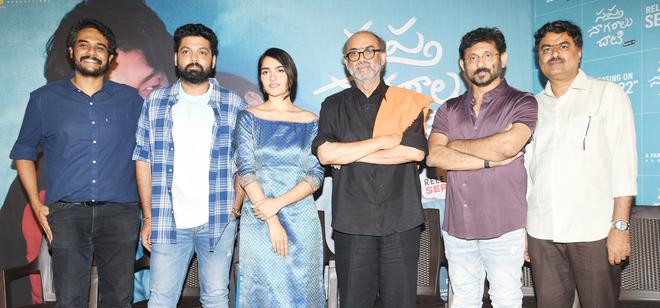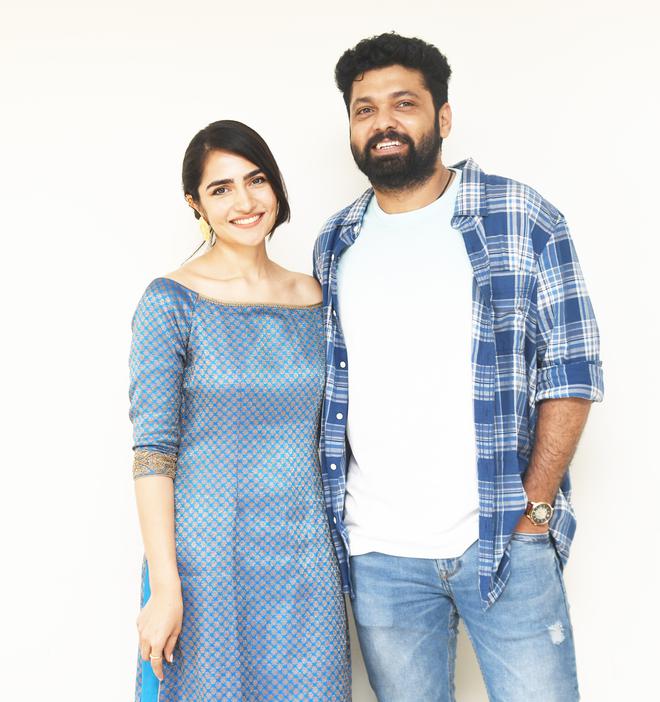Actor-producer Rakshit Shetty, writer-director Hemanth Rao and actor Rukmini Vasanth believed that their romantic saga, Sapta Sagaradhaache Ello-Side A (SSE-Side A), will travel far and wide. The Kannada film had a limited release in Hyderabad a few days ago and piqued curiosity after rave reviews poured in. With the Telugu version Sapta Sagaralu Dhaati - Side A, releasing on September 22, Rakshit Shetty tells The Hindu during a brief visit to the city that he believed in the film’s potential. “We have also dubbed in other languages, but Telugu will be the first one to be released.”
KGF and Kantara opened the floodgates for Kannada cinema to aim for a larger reach. Some of Rakshit’s previous films, such as 777 Charlie, Avane Srimannarayana and Kirik Party made him a familiar name among Telugu movie buffs. SSE-Side A differs from the rest in its poetic narration of a love story that can leave viewers emotionally hungover and waiting in anticipation of SSE-Side B, which releases in October.
Hemanth reveals that he was particular about the intonation and dialogue delivery for the Telugu version to ensure a similar experience as the original. “Vijay (Vijay Kumar), who handled the Telugu dubbing, saw the film and was moved and wanted to give his best in terms of writing. I trusted him.”
Hemanth and Vijay discussed voice modulation in detail. “The way you pause, smile or breathe makes a difference. We discussed the breathing pattern in terms of how someone speaks. Vijay sent me sample voice notes and we chose artistes who would fit the characters of Manu (Rakshit) and Priya (Rukmini).”

SSE-Side A wasn’t initially intended to be a two-part romance. Hemanth had a script in place but on set, structured some of the sequences to allow for more breathing space. Rakshit says he knew intuitively that they were on to something magical. “Somewhere down the line, he told me it is turning out to be more than one film. As a producer, I did not stress. We had only spent half the budget of what I had in mind. So we still had the rest of the money. If it organically turns out to be two films, it would be an advantage for me as a producer. We decided to shoot and then take a call,” recalls Rakshit.
Once the film was shot, Hemanth watched it and felt that this story would work better in two parts, allowing room for the emotional segments to breathe. Rakshit then watched the footage and agreed. “The script is my moral compass,” explains Hemanth. “But it is also like clay. A film communicates to you and you adapt to the scenario.”
SSE-Side A is an understated love story of a middle-class couple who dream of getting married and having a small house by the sea. An unexpected turn of events throws their life out of balance. Some segments could have been leveraged for masala moments but SSE-Side A holds back to a large extent.
During the pre-filming workshop, Hemanth’s diktat to his actors was to allow themselves to be vulnerable. The silences, glances and the smallest of expressions had to count. “We wanted to create an emotional experience for viewers. A good love story is voyeuristic since you are experiencing someone else’s life. We all pushed each other and got the best.”

Rakshit reveals that it helped that they filmed in sequence. “Hemanth films the first 15 minutes and moves to the next 15 minutes. That made it easier. In the initial segments it was romance and we had workshopped for it. Later he took me to the prison. I was visiting for the first time; my lack of familiarity helped with how my character Manu would react.”
Rukmini, whose internalised performance is reminiscent of Revathy in her younger years, says her process involved a lot of writing. “By nature I am an anxious actor and do a lot of homework. I then relied on my drama school technique of journaling.” Understanding her character, Priya, involved understanding the character’s childhood, her bond with her father, a home by the sea, her relationship with her mother, and what makes her stand by Manu. “Hemanth will give you these different aspects of a character and allow you to work with it. There was so much freedom that it was magical.”
While the trend is towards larger-than-life spectacles for filmmakers who want to take their films across language borders, Rakshit and Hemanth were confident that there is an audience for an emotional romance. “I will be directing my next four to five films and I am also open to mass cinema. The exposure I get with that cinema will in turn help my niche films. In this case, I was sure of Hemanth’s craft. I was overwhelmed with how he directed Kavuladhari,” says Rakshit.
Hemanth, the screenwriter for Sriram Raghavan’s Andhadhun, says he had to think if SSE would be a wise choice for Rakshit. “He is blindly in love with cinema and will do anything for the love of it. I had to think if this would be a good move for him.” A fan of Mani Ratnam’s cinema, he adds, “Films have to make money. But it is also about creating an experience people can take home with them.”







